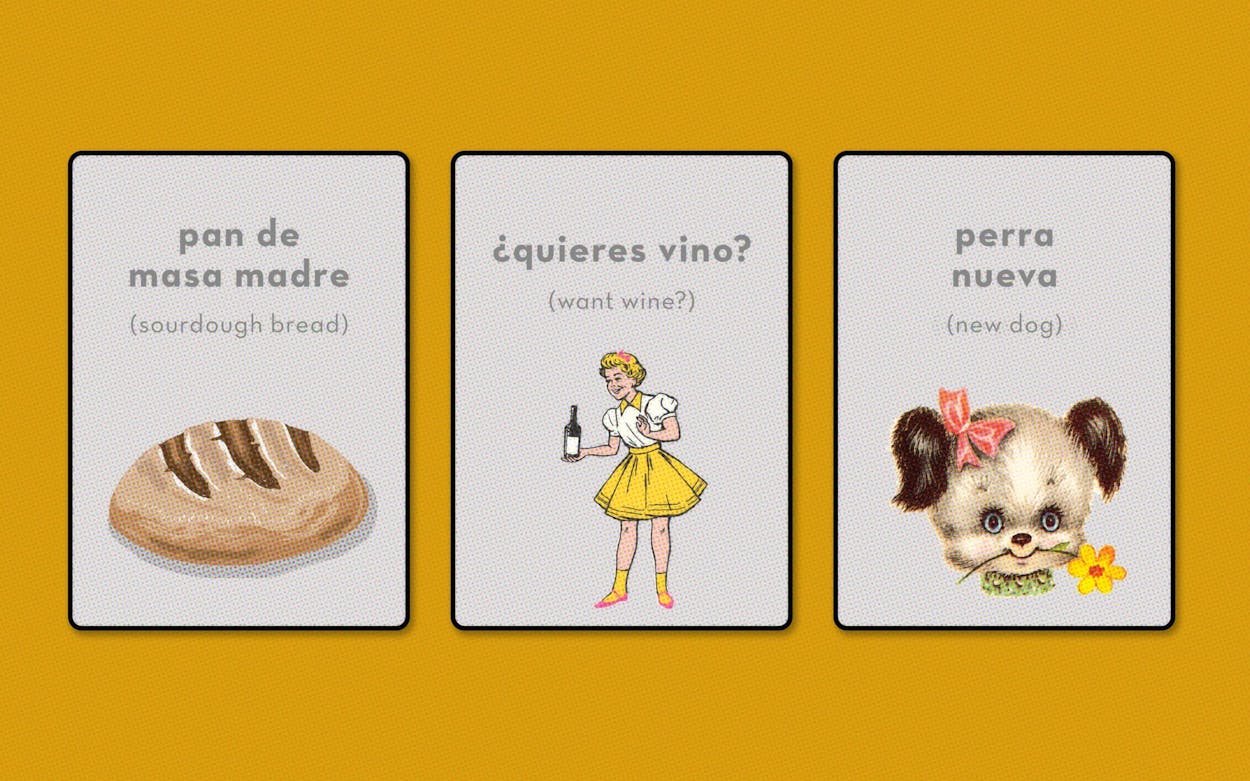In January 2020, roughly one hundred years ago, I decided to try to recapture the little Spanish I once knew and enrolled in a second-level beginner class that met three times a week at downtown Austin’s Freestyle Language Center.
I liked the class. It was informal and fun, with about ten other students of different ages and professions. (Oh, sure, I was probably the oldest person in the class at seventy, even though there were a couple of close competitors. But so what? These days, I’m often the oldest person in a room. I’m almost used to it. If I want to feel young and lively, I’ll hang out at a cemetery.)
I have an enormous bias toward people who are interested in languages, something that tells me they’re curious about the world and other cultures. For me, being in the class was like being in a newsroom or a library or a bookstore: I felt at home. I was with people who were like me—until mid-March.
As the outside world collapsed and went virtual, we met online three times a week to grapple with vocabulary, pronunciation, irregular verbs, and past tenses. I got used to seeing my classmates and teacher in little squares on my computer screen. It wasn’t up close and personal, but then, what was? These Spanish classes were an escape from a world that overwhelmed and threatened.
Over the next few months, I reenrolled in the May term, and did so again in the summer, then the fall, gradually moving into low-intermediate classes. A few students came and went, but there was still a core group of regulars who kept showing up. Before class, during class, and in small groups, we tackled grammar, but we also talked about our interrupted lives, the isolation, the uncertainty, the losses of the pandemic. Usually, we spoke haltingly in Spanish, but sometimes we switched into English. (When you’re feeling upset and vehement, it turns out, the lure of your native language can be irresistible.)
Class after class, we saw glimpses of one another’s lives—bookshelves and outdoor patios, coffee cups and wine goblets, faces lit by daylight, then, as the days shortened, by lamps. We noticed haircuts and sunburns. We were introduced to dogs who came and went. We got to meet Kara’s new canine, Rita (the most talented dog in the world, Kara told us repeatedly). We knew Laura’s work as an architect was demanding, that Craig took wonderful photographs. Nicole loved to travel and Sara was a health-care consultant. Anna, whose family had emigrated from Russia, had landed in Dallas on Halloween and went trick-or-treating with the neighborhood kids; the next evening, she was disappointed to learn that costumes and candy didn’t happen every night, even in the land of the plenty. And Lizzie moved to Philadelphia in time to vote there in the 2020 election.
Over time, one particular class opener—¿Qué hay de nuevo? (“What’s new?”)—drew occasional irritation. We were stuck at home in the middle of a pandemic, that’s what we were doing! Nothing was new. Yesterday was like today, el sábado fue como un lunes, which was pretty much like Wednesday, come to think of it. We were living featureless lives, inching through beige days and gray nights.
¿Qué hay de nuevo? Nada.
But again and again, on those days when my mood plummeted and every hour I wanted to burst into tears apropos of absolutely nothing and just about everything, I was always helped by those Spanish classes. Somehow, trying to remember new words, pursuing arcane grammatical rules, entering our now-familiar online world, I almost always shed the self-pity and forgot about myself.
As fall wore on and the November 3 election neared, our Mexico City–born teacher Daniela noticed our whole class looked a little ragged. Most of us were sleepless, hollow-eyed, and obsessed, on a fast track to 2020 election zombie meltdown. We needed help.
Apapachar was what was required, Daniela told us. Originally from the Aztec language, apapachar had originally meant to cuddle or touch softly. More recently, particularly in Mexico, it had come to mean taking care of yourself. Apapachar! We needed to cut out the constant social media, the TV news, and get outside and walk. We promised we’d try.
The election finally passed. Our class calmed down and cheered up and started to look like members of the human race again. Also, for the first time, we began to study the simple future tense (as opposed to the informal “going to” future tense). Over a week or so, we threaded our way through the regular verb forms, then into the inevitable irregular ones.
One evening, Daniela divided our class into pairs. Since we had come to know each other fairly well, we were to write predictions for each other, using the simple future tense, of course. In ten minutes, we would read them aloud.
Heads bowed down as we worked. Then we began to speak. Craig forecast travel and Spanish fluency for Anna, Kara expected Sara to live on all seven continents, including Antarctica, and I was sure Nicole would write her first successful novel, in between trips. Most dramatic of all, Lizzie announced that Laura would take a long-delayed trip to see her mother, where she would stumble across a book that would reveal all the secrets of life to her.
Listening to all of us, one by one, I felt myself began to smile uncontrollably. Month after month, we had trudged through a vicious election, a racial reckoning, a pandemic, loneliness, boredom, canceled plans and hopes. And now here we were—eight strangers, all shut in our respective houses and apartments, our faces lit by computers—stubbornly ignoring the bleak world around us. We wanted so much for one another, such ridiculously glamorous and happy futures. I looked from face to face on my computer—all of us smiling by now—and realized how much we wanted to save one another.
- More About:
- Pandemic






